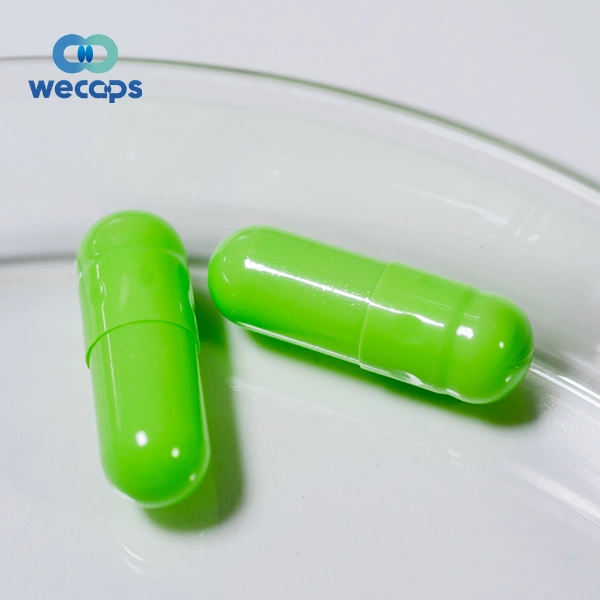- This topic is empty.
-
AuthorPosts
-
2024-06-07 at 4:17 pm #22956
Capsules are a common form of dietary supplement delivery, offering a convenient and efficient way to consume various nutrients, vitamins, and minerals. Both hard cellulose capsules and liquid capsules have their own benefits that influence the choice consumers make based on their specific needs and preferences. In this blog post, Wecaps will share the details of hard cellulose capsule shells and liquid capsule shells, comparing their properties and advantages.
Understanding the Basics
Hard Cellulose Capsule Shell (HCC):
Hard cellulose capsules are made from a two-piece shell composed of vegetarian alternatives like hydroxypropyl methylcellulose (HPMC), or starch. They are designed to encase powdered, granulated, or even liquid ingredients. HCCs are popular for their ease of manufacturing, consistent size, and ability to mask strong odors or tastes of the encapsulated material.

Liquid Capsule Shell:
Liquid capsules, on the other hand, are pre-filled with liquid substances. They are usually made from a soft, flexible material and are sealed with a band or a plug. Liquid capsules are ideal for encapsulating oils, extracts, and other liquid-based formulations that are not easily compressed into a solid form.
Manufacturing Process
HCC Manufacturing:
The production of hard cellulose capsules involves a precise process where the shell material is heated and formed into two half-shells. These shells are then filled with the desired ingredients and sealed together. The hard shell provides structural integrity and protection for the contents.
Liquid Cellulose Capsules Manufacturing:
Liquid capsules are manufactured by filling a soft, pre-formed shell with the liquid substance. The shell is then sealed, often with a band that can be heat-sealed or with a plug that is inserted and sealed. The soft nature of the shell makes it more susceptible to damage if not handled carefully.
Advantages of Hard Cellulose Capsules
1. Durability:HCCs are more robust and less prone to damage during shipping and handling compared to soft liquid capsules.
2. Protection:The hard shell acts as a barrier, protecting the contents from environmental factors such as moisture, light, and air.
3. Masking Unpleasant Tastes:HCCs can effectively mask the taste of the encapsulated material, which is particularly useful for ingredients with strong or unpleasant flavors.
4. Consistency:The uniform size and shape of HCCs make them ideal for automated filling and packaging processes.
Advantages of Liquid Cellulose Capsules
1. Ease of Ingestion:Liquid capsules tend to dissolve more quickly in the stomach, which can be beneficial for faster absorption of certain ingredients.
2. Flexibility:They can accommodate a wide range of liquid formulations, including oils and extracts that are not suitable for hard capsules.
3. No Need for Fillers:Liquid capsules often require fewer or no additional fillers or binders, which can be an advantage for those seeking a more natural product.

Considerations for Consumers:
1. Ingredient Form:If the supplement is a liquid or oil, a liquid capsule may be more appropriate.
2. Dietary Restrictions:Vegetarian or vegan consumers should opt for cellulose-based HCCs or ensure the liquid capsule is made from suitable materials.
3. Taste Sensitivity:Those sensitive to the taste of certain supplements may prefer HCCs for their odor and taste-masking properties.
4. Absorption Preferences:Some may prefer the quicker dissolution and potential for higher bioavailability offered by liquid capsules.
Both hard cellulose capsule shells and liquid cellulose capsule shells serve their purposes effectively, catering to different types of supplements and consumer preferences. The choice between the two will largely depend on the specific formulation of the supplement, the individual's dietary needs, and personal preferences regarding taste and ease of ingestion. Wecaps is committed to providing various customized empty capsule solutions. Welcome to contact us!
Frequently Asked Questions
1. What is the primary material used in the production of hard cellulose capsule shells?
Hard cellulose capsule shells are typically made from plant-based fibers, such as hydroxypropyl methylcellulose (HPMC), which is a derivative of cellulose. This material is preferred by vegetarians and vegans.
2. How do liquid cellulose capsule shells differ in their filling capabilities compared to hard cellulose shells?
Liquid cellulose, or soft, capsule shells are more flexible and can be filled with liquid or semi-solid ingredients. They are often used for oils, herbal extracts, and other substances that are not easily compressed into a solid form. In contrast, hard cellulose capsules are filled with powders, granules, or small solid dosage forms.
3. What are the advantages of using hard cellulose capsule shells for pharmaceutical applications?
Hard cellulose capsule shells are easy to expand and manufacture, easy to package and have high product stability. They can also be used for combination filling, allowing for the encapsulation of multiple drugs in a single capsule, which can be beneficial for achieving specific drug release profiles or for combining previously incompatible drugs.
4. How do the mechanical properties of hard cellulose capsule shells compare to those of liquid cellulose shells?
Hard cellulose capsule shells are generally more rigid and robust than liquid cellulose shells. They can be assessed for mechanical properties such as elastic stiffness and elongation at break using a texture analyzer. The presence of water or hydrophilic components in the formulation can affect the mechanical properties of hard cellulose shells, potentially leading to issues like brittleness or softening.
5. What considerations should be taken into account when choosing between hard and liquid cellulose capsule shells for a specific formulation?
When selecting a capsule shell material, one should consider the physico-chemical properties of the formulation, including solubility, stability, and the desired release profile of the active ingredients. Hard cellulose shells are better suited for dry or powdered medicines, while liquid cellulose shells are ideal for oily medicines or those requiring a liquid or semi-solid carrier. Additionally, the choice may be influenced by the target consumer base, such as vegetarian or vegan patients.
https://www.wecaps.com/industry-news/hard-cellulose-capsule-shell-vs-liquid-capsule-shell.html
Wecaps
inquiry@wecaps.com -
AuthorPosts
- You must be logged in to reply to this topic.